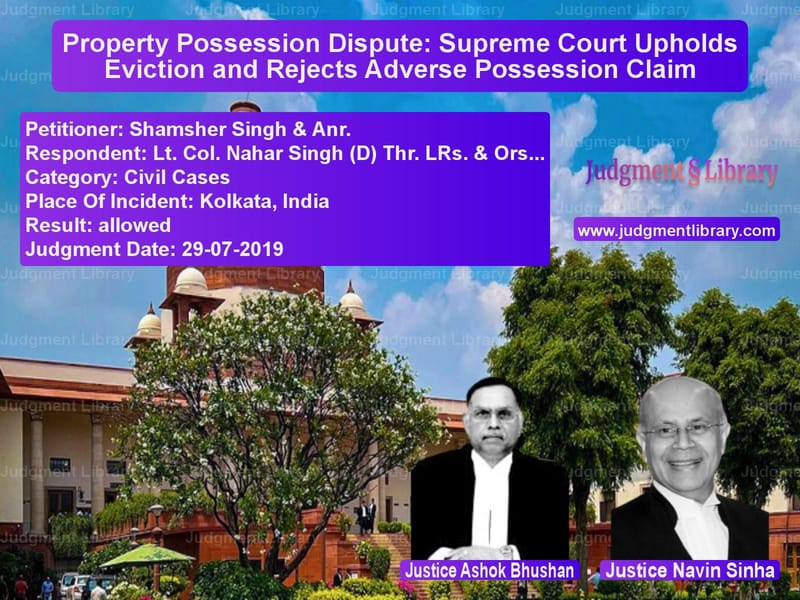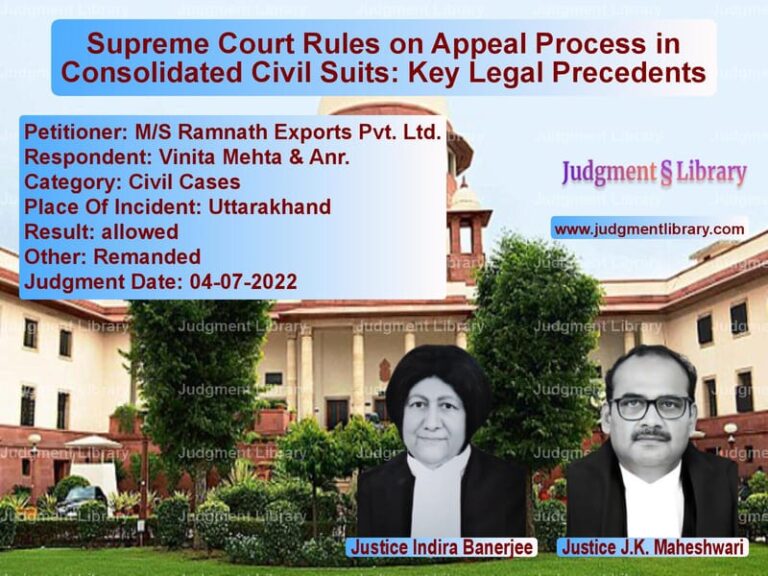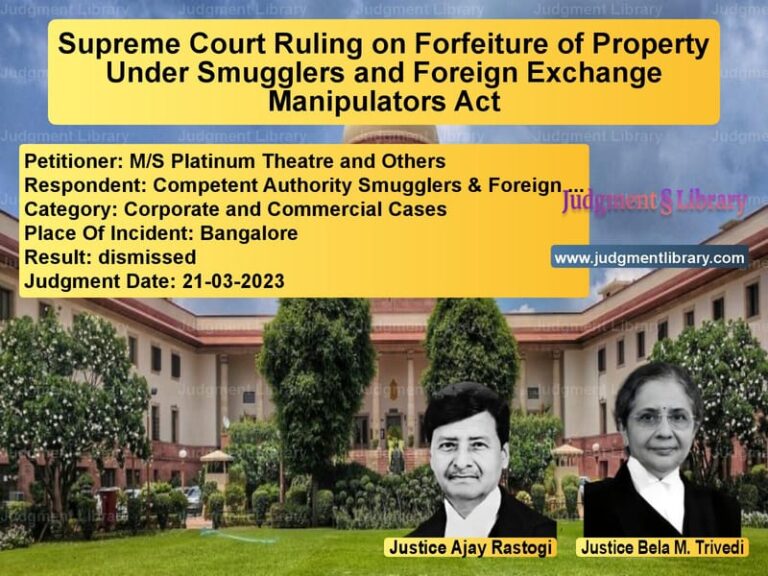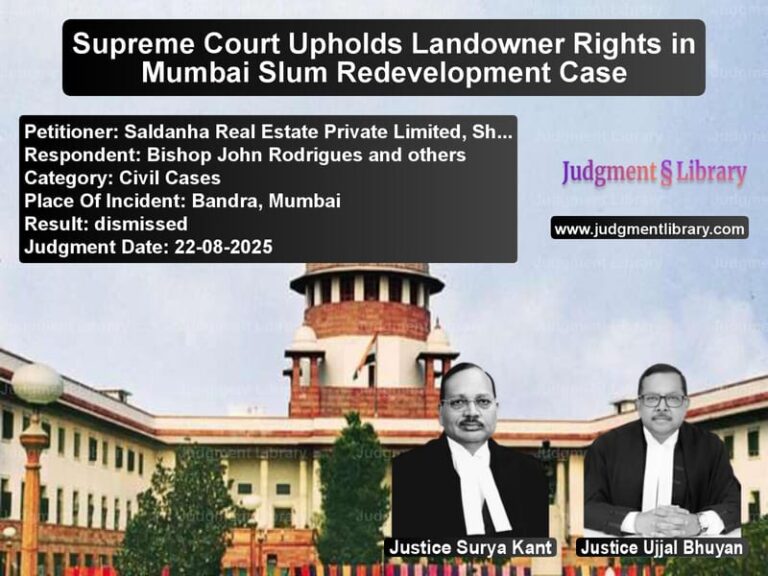Property Possession Dispute: Supreme Court Upholds Eviction and Rejects Adverse Possession Claim
The case of Shamsher Singh & Anr. vs. Lt. Col. Nahar Singh (D) Thr. LRs. & Ors. is a crucial judgment that clarifies the legal principles governing property possession disputes, the execution of civil court decrees, and the scope of adverse possession claims. The Supreme Court overturned the Calcutta High Court’s order that reinstated the possession of the respondent, holding that the eviction was lawful and the claim of adverse possession was not substantiated.
The dispute arose over a property located at 15, Sahanagar Road, Kolkata. The appellants, Shamsher Singh and Rajvindar Singh, had obtained a decree for possession of the property and sought its execution. The respondent, claiming to be in possession for decades, argued that he had acquired title through adverse possession. The High Court ruled in favor of the respondent and ordered his reinstatement in possession. However, the Supreme Court found the High Court’s ruling erroneous and reinstated the eviction order.
Background of the Case
The property in question originally belonged to Tarapada Dutta. After his demise, a legal battle emerged regarding ownership and possession. The main events in the case were as follows:
- Two separate agreements for sale were executed by Anadi Dutt, who claimed to be the son of Tarapada Dutta.
- One agreement was in favor of Rajvindar Singh, and another was in favor of Shamsher Singh.
- When Anadi Dutt failed to execute the sale deed, two title suits were filed by Rajvindar Singh and Shamsher Singh, which were decreed ex-parte on December 20, 1994.
- Deeds of conveyance were executed in favor of Dayal Singh (nominee of Rajvindar Singh) and Shamsher Singh.
- Execution proceedings were initiated, and the Court Bailiff, with the help of police, delivered possession of the suit premises to the decree holders on April 12, 1996.
Following the execution, respondent Lt. Col. Nahar Singh’s legal representatives filed objections, claiming possessory title based on adverse possession.
Petitioner’s Arguments
The appellants, Shamsher Singh and Rajvindar Singh, contended that:
- The execution decree was valid and had been lawfully carried out.
- The respondent’s claim of adverse possession was legally untenable.
- The High Court had no legal basis to reinstate the possession of the respondent.
- The execution proceedings were carried out in accordance with civil procedure laws and were not vitiated by any procedural irregularities.
Respondent’s Arguments
The respondent, Lt. Col. Nahar Singh’s heirs, argued that:
- They had been in continuous possession of the property since 1965.
- Their possession had matured into ownership through adverse possession.
- The eviction was unlawful as their title claim had not been adjudicated upon.
- The High Court correctly reinstated possession as the execution of the decree had ignored their possessory rights.
Supreme Court’s Observations
The Supreme Court, in its judgment delivered by Justices Ashok Bhushan and Navin Sinha, ruled in favor of the appellants and set aside the High Court’s order.
Failure to Prove Adverse Possession
“The respondent failed to establish his case that he has acquired right, title, and interest over the suit property by way of adverse possession.”
The Court found that the respondent had not provided sufficient evidence to prove uninterrupted and exclusive possession for the statutory period required to establish adverse possession.
Execution of Decree Must Be Respected
“The High Court committed an error in allowing the appeal and setting aside the execution order, which was based on a legally valid decree.”
The Supreme Court emphasized that once a decree is passed and executed, it cannot be set aside merely based on unsubstantiated claims of possession.
Legal Principles Discussed
The Supreme Court referred to key legal principles, including:
- Adverse possession requires uninterrupted and exclusive possession for at least 12 years.
- Execution of a valid decree should not be undone without strong legal grounds.
- Occupants without legal title cannot resist eviction solely based on long possession.
- Order XXI Rules 98, 99, and 100 CPC govern execution proceedings and protect decree holders.
Final Ruling and Impact
The Supreme Court ruled:
- The execution order was valid and must be reinstated.
- The respondent’s claim of adverse possession was legally unsustainable.
- The High Court’s judgment was set aside, and the order of the executing court was restored.
Legal Precedents Considered
The Supreme Court relied on key rulings, including:
- K.K. Verma vs. Union of India: Defined the legal requirements for proving adverse possession.
- Order XXI CPC Rules 98, 99, and 100: Clarified the execution process and protection of decree-holders.
Implications of the Judgment
This ruling has significant implications for property disputes:
- Execution orders must be respected unless overturned through proper legal channels.
- Adverse possession claims require strong documentary evidence to be upheld in court.
- Occupants without legal title cannot claim ownership merely based on long-term possession.
Conclusion
The Supreme Court’s decision in Shamsher Singh & Anr. vs. Lt. Col. Nahar Singh (D) Thr. LRs. & Ors. reinforces the principle that property possession must be backed by legal ownership. By overturning the High Court’s ruling, the judgment ensures that eviction orders based on valid decrees are not obstructed by weak claims of adverse possession. This ruling serves as a strong precedent for similar property possession disputes, emphasizing the need for strict adherence to legal principles in property matters.
Petitioner Name: Shamsher Singh & Anr..Respondent Name: Lt. Col. Nahar Singh (D) Thr. LRs. & Ors..Judgment By: Justice Ashok Bhushan, Justice Navin Sinha.Place Of Incident: Kolkata, India.Judgment Date: 29-07-2019.
Don’t miss out on the full details! Download the complete judgment in PDF format below and gain valuable insights instantly!
Download Judgment: Shamsher Singh & Anr vs Lt. Col. Nahar Singh Supreme Court of India Judgment Dated 29-07-2019.pdf
Direct Downlaod Judgment: Direct downlaod this Judgment
See all petitions in Property Disputes
See all petitions in Specific Performance
See all petitions in Judgment by Ashok Bhushan
See all petitions in Judgment by Navin Sinha
See all petitions in allowed
See all petitions in supreme court of India judgments July 2019
See all petitions in 2019 judgments
See all posts in Civil Cases Category
See all allowed petitions in Civil Cases Category
See all Dismissed petitions in Civil Cases Category
See all partially allowed petitions in Civil Cases Category







